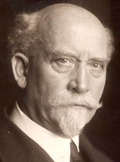| Worked as typesetter and proofreader in Kassel; joined the Social Democratic Party (Sozialdemokratische Partei Deutschlands, SPD) in 1883; edited social democratic newspapers in Gießen, Nürnberg, Offenbach and Kassel (1895-1905); was elected a member of the Reichstag for Düsseldorf (1903-1919) and joined the majority of his party in supporting Germany's participation in World War I; served as a deputy of municipal council in Kassel (1906-1911); was promoted to the position of secretary in the SPD executive board (1911); headed the party faction in the Reichstag in 1913-1918 (with Hugo Haase); after the split with the independent social democrats (Unabhängige Sozialdemokratische Partei Deutschlands, USPD), he was elected to the SPD executive board; appointed minister without portfolio (Oct 1918 - 9 Nov 1918) in the last imperial cabinet of Maximilian Prinz von Baden; following the announcement about the abdication of Emperor Wilhelm II (9 Nov 1918), addressed the people from the balcony of the Reichstag with a famous speech, in which he proclaimed a German republic; according to the agreement between SPD and USPD (10 Nov 1918), entered the Council of People's Commissioners (Rat der Volksbeauftragten) with responsibility for finance; subsequent to the departure of USPD members on 29 Dec 1918, he was approved (30 Dec 1918) as co-chairman of the Council (with Friedrich Ebert); was entrusted to form the first government of the Weimar republic (11 Feb 1919) and appointed President of the Reich Ministry (13 Feb 1919); formed the Cabinet of SPD, Democratic Party (Deutsche Demokratische Partei), and the German Centre Party (Deutsche Zentrumspartei, commonly known as Zentrum); the government existed for less than five months and collapsed before the National Assembly approved new constitution of the German Reich; resigned in protest over the Treaty of Versailles; served as a member of the SPD executive board (1919) and then assumed the office of mayor of Kassel (1920-1925); was elected to the Reichstag from the Hessen-Nassau constituency (1920-1933); survived the attempt of assassination (4 Jun 1922); with the rise of Nazism, he emigrated from Germany (1933) and died in exile in Denmark. Biography source: [2] |

